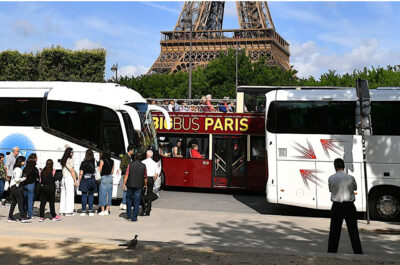The proposal includes more than 30 provisions aimed at improving the crew protection against fatigue, offering them safer and better working conditions. They include important issues such as in-flight rest for cabin crew, and strict limits on night flights, standby and reserve.
Following the European Parliament‘s vote in plenary, Vice-President Siim Kallas said: “I am pleased with this vote which opens the way for new stricter EU-wide rules on pilot fatigue. It will bring better protection of passengers and safer working conditions for crew. This is a victory for common sense.”
The purpose of this new legislation to modernise the high European standards on aviation safety is to clarify and improve the current regulations on flight and duty time limitations (known as flight time limitations, or “FTL”) – taking into account the latest scientific and technical evidence.
The proposal includes more than 30 provisions aimed at improving the crew protection against fatigue, offering them safer and better working conditions. They include important issues such as in-flight rest for cabin crew, and strict limits on night flights, standby and reserve.
The new legislation includes:
- The reduction of flight duty time at night by 45 minutes (maximum 11h instead of 11h45),
- The reduction of the maximum number of flying hours from 1,300 to 1,000 in 12 consecutive months,
- The increase of the weekly rest by 12 hours (2 days instead of 1½ day) twice a month,
- The grant of up to 5 days of rest at home base in case of significant time zone crossing (instead of 2 days currently, or even less in some Member States),
An important reduction of the maximum duty time (standby + flight time) in case of airport standby (16h instead of 26–28h in some Member States).
FTL safety rules are without prejudice to the applicable EU and national legislation, including rules concerning working time, health and safety at work or existing and future collective labour agreements (CLAs). In addition, the relation between safety and social rules is based on the principle that the most protective rule applies.
In supporting the draft regulation, the European Parliament confirmed the view of the majority of aviation safety professionals in favour of a comprehensive and well balanced approach which will bring about safety improvements to flight attendants and pilots in the European aviation sector – to the benefit of passengers.
The draft Commission regulation received a positive vote in the EASA Committee meeting on 12 July 2013 and was submitted to the EP for a three-month scrutiny.
Next steps:
The Commission will now formally enact the Regulation. It can be expected to come into force at the end of 2013 and will become fully applicable two years later.
There will be a continuous on-going assessment of the new FTL regime, run by EASA alongside Member States and involving stakeholders and scientific expertise, which will be based on real operational data, to monitor the effectiveness of the system. EASA’s first regular report on the results of the monitoring programme is due no later than three years after the date of application of the rules.
Flight Safety Compromised
“Today (yesterday) the European Parliament (EP) voted for a Regulation that is not to the benefit of the flying public in Europe,” says Nico Voorbach, ECA President, after the adoption of the new EU Flight Time rules by the EU Parliament this afternoon. “With this approval the EP took a step away from a ‘precautionary’ approach, ignored scientific expert advice and put passenger safety at risk.”
Pilots and cabin crew from across Europe have repeatedly highlighted the safety loopholes of the regulation proposed by the EU Commission: excessively long night flights of up to 12hrs30 – while scientists have set the safe limit at 10 hours – and a combination of standby and flight duty, which could lead to pilots landing aircraft after having been awake for more than 22 hours.
“These safety concerns remain as valid after the Parliament’s vote as before,” says Philip von Schoppenthau, Secretary General of ECA. “The ‘clarifications’ from Commissioner Kallas yesterday did not offer any genuine solutions, came in the last minute and, again, did not take account of what numerous scientific reports recommend as safe practices.”
“By adopting these rules, the Parliament endorsed the Commission’s approach of taking risks – avoidable risks,” stresses Voorbach. “Now that these rules are adopted, in case of an accident related to aircrew fatigue, Europe’s citizens will have to hold accountable those who promoted this flawed proposal.”
The EU Parliament passed the EU Commission proposal despite the vote for rejection of the rules on 30 September in the EU Transport Committee. Pilots have in the past few months intensively sought improvement of the rules through the European Aviation Safety Agency (EASA) and the European Commission. Regretfully, the Commission has not amended its flawed proposal despite some verbal ‘clarifications’, which do not constitute any improvement to the rules.
“The rules have been rushed through the EU Parliament after the EP Transport Committee firmly rejected them, only last week. And this vote today is not a ‘victory for common sense’, as Mr Kallas claims. It is victory for intransparency, commercial interests and short-sightedness”, says von Schoppenthau. “Europe has lost a unique opportunity to be a forerunner on flight safety, to have safe, science-based rules, based on best practices.”
Vicky is the co-founder of TravelDailyNews Media Network where she is the Editor-in Chief. She is also responsible for the daily operation and the financial policy. She holds a Bachelor's degree in Tourism Business Administration from the Technical University of Athens and a Master in Business Administration (MBA) from the University of Wales.
She has many years of both academic and industrial experience within the travel industry. She has written/edited numerous articles in various tourism magazines.


















































































































































































































